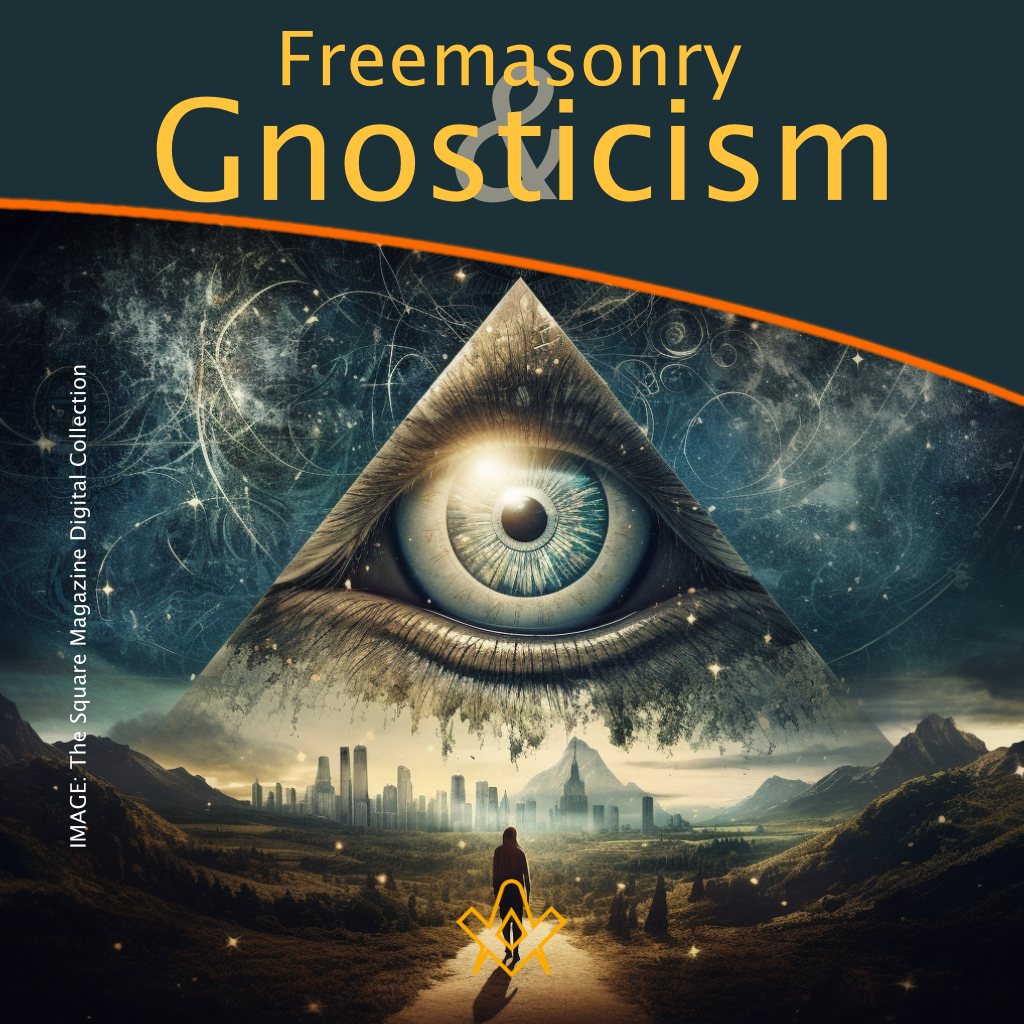The relationship between Freemasonry, a fraternal organization with roots in medieval craft guilds, and Gnosticism, an umbrella term for various ancient religious and philosophical movements, has been a subject of fascination for scholars, conspiracy theorists, and enthusiasts alike.
This article seeks to provide a comprehensive, engaging, and easily understandable analysis of any possible links between these two diverse systems while demystifying misconceptions for the reader.
Freemasonry has its origins in the medieval stonemason guilds, which organized skilled craftsmen belonging to three different ranks: apprentice, journeyman or fellow, and master.
Over time, these groups began to incorporate speculative elements, attracting individuals interested in philosophical, moral, and symbolic teachings.
As Freemasonry evolved into the modern-era organization, it drew on a multitude of influences, including biblical narratives, ancient mythology, and medieval practices.
Main Tenets of Freemasonry
While Masonic ideologies vary across different jurisdictions, some main aspects of the organization generally remain consistent:
Brotherhood: Freemasonry promotes the idea of a worldwide brotherhood, emphasizing unity, equality, and mutual support.
Ethics and Morality: Members are taught to practice high moral standards, honesty, and integrity in their daily lives.
Self-improvement: Masons are encouraged to engage in a continual process of self-discovery, learning, and self-improvement.
Philanthropy: Charity and community service are central to Masonic principles and members regularly engage in helping those in need.
The Core of Gnosticism
Gnosticism encompasses a vast array of religious and philosophical movements from the ancient world that emerged during the first few centuries CE.
The term “gnosticism” itself stems from the Greek word “gnosis,” indicating “knowledge” or “insight.” Gnostic groups held diverse viewpoints, but there are several quintessential themes that surface in many Gnostic systems:
Dualism: Gnosticism characteristically posits a dualism between the material world (regarded as chaotic and inferior) and the spiritual realm (seen as pure and transcendent).
Divine Spark: Gnostics assert that each individual possesses a divine spark, an element of divinity entrapped in the material body, yearning to return to its divine source.
Salvation: According to Gnostic traditions, salvation is attained through gnosis, a profound knowledge that liberates the divine spark from the material world and unites it with the divine realm.
Archons and Demiurge: Gnostic systems often describe archons and the Demiurge, beings who obstruct the soul’s ascent to the divine realm.
Though Freemasonry and Gnosticism are distinct entities with their unique historical origins, their shared symbols and themes fuel speculation on their degree of interconnectedness. One area of overlap lies in the pursuit of hidden knowledge or wisdom.
Gnostics sought gnosis to attain salvation, while Masons engage in the quest for self-improvement and moral growth through symbolic and allegorical teachings.
Consider the Masonic symbol of the All-Seeing Eye or Eye of Providence, believed to represent the watchful gaze of the Creator.
While the symbol predates both Freemasonry and Gnosticism, Gnostic sects also appropriated the All-Seeing Eye to symbolize divine guidance and protection. Additionally, both systems attach great importance to light as a metaphor for knowledge, enlightenment, and spiritual awakening.
A possible connection between Freemasonry and Gnosticism can be traced to the Hermetic tradition, a group of religious, philosophical, and magical beliefs originating in Hellenistic Egypt.
Hermetism syncretized Egyptian religious elements with Greek philosophical concepts, forming an esoteric tradition that persisted throughout the Renaissance.
Some of the Hermetic texts contained Gnostic thought, and when the Hermetica was rediscovered in Europe during the Renaissance, it potentially influenced the development of Freemasonry.
Another potential conduit between Freemasonry and Gnosticism is Rosicrucianism, an esoteric Christian movement from the early 17th century.
Rosicrucianism proposed a return to the fundamental truths of early Christianity by re-emphasizing spirituality, direct communication with God, and the importance of hidden, inner knowledge.
The Rosicrucian movement’s magical, alchemical, and Gnostic influences might have been passed to Freemasonry during the 17th and 18th centuries.
Given the available historical evidence, definitive links between Freemasonry and Gnosticism remain speculative.
However, philosophical parallels between the two systems can provide valuable insights into their potential interconnectedness.
For instance, both Freemasonry and Gnosticism promote self-improvement and self-knowledge, promoting ideals of enlightenment, moral growth, and spiritual development.
Freemasonry is a multifaceted tradition that has evolved by incorporating diverse influences, making it challenging to pinpoint Gnostic elements exclusively.
Additionally, the vast range of Gnostic beliefs and the complex relationship between spiritual, philosophical, and religious movements during the formation of both Freemasonry and Gnosticism complicate any attempt to establish definitive connections.
In conclusion, while Freemasonry and Gnosticism share some intriguing symbols, themes, and philosophical ideas, any direct and definitive connection remains a matter of ongoing scholarly investigation.
Ultimately, studying the connections and parallels between these two prominent systems can deepen our understanding of human spirituality, our desire for transcendent knowledge, and our journey toward self-discovery and enlightenment.
Article by: Margaret S.

Margaret S. is a retired lecturer and devotes much of her time to theological and philosophical writing.
She was made a Freemason in the International Order of Freemasonry for Men and Women - Le Droit Humain.
(Margaret S. is her pen name for all her masonic papers)
Recent Articles: Esoteric Masonry
 Explore the multifaceted concept of the Divine across various cultural and religious perspectives. Delve into the intriguing deliberations on the Great Architect, Demiurge, and their roles in shaping our understanding of the cosmos, blending philosophical, theological, and metaphysical insights into a rich tapestry of human spirituality. |
 Unveiling the Mysteries: Explore the Enigmatic World of Rosicrucianism! Dive into the fascinating origins and teachings of the Rosicrucian tradition, shaped by the mythical figure Christian Rosenkreuz. Discover the secrets of alchemy, spiritual transformation, and esoteric knowledge. Unlock the hidden wisdom that has captivated seekers for centuries. Unleash your inner mystic today! |
 An Esoteric Interpretation of the Holy Royal Arch Delving into the profound mysteries of the Holy Royal Arch, Matt DA Fletcher offers an esoteric interpretation that challenges the conventional understanding of Freemasonry. While Craft Masonry is clear in its teachings, the Royal Arch remains an enigma for many. Fletcher's exploration uncovers the symbolic and philosophical depths of this degree, revealing its significance in the Mason's journey towards reintegration with the Creator. |
 Stoicism, Freemasonry, and the Modern Man Discover how the ancient wisdom of Stoicism can enrich Freemasonry and modern life. Dr. Chacón-Lozsán Francisco M.˙.M.˙. explores Stoic principles like virtue, resilience, and inner peace, offering practical insights for today's challenges. Learn how these timeless teachings can foster personal growth, ethical conduct, and emotional stability. |
 Explore the evolution of Masonic rites with the Universal Rite, a modern adaptation of the Ancient and Accepted Scottish Rite. Discover how it integrates contemporary principles, promotes intercultural dialogue, and ensures the timeless values of Freemasonry remain relevant in today's world. |
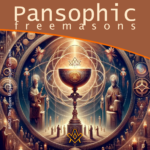 Unveil the secrets of Pansophic Freemasonry, a transformative journey through the ancient mystical traditions. Delve into the sacred realms of Rosicrucianism, Templar wisdom, Kabbalah, Gnosticism, and more. Discover the Graal, the sacred Grail that connects all esoteric paths. Embrace a holistic spiritual quest that reveals the profound mysteries of self and the universe. |
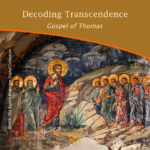 Dive into a spiritual journey where self-awareness is the key to enlightenment. The Gospel of Thomas and Masonic teachings converge on the profound truth that the path to transcendent wisdom lies within us. Embrace a diversified understanding of spirituality, emphasizing introspection as the gateway to a universally respected enlightenment. Explore, understand, transcend. |
 Philosophy the Science of Estimating Values Philosophy is the science of estimating values. The superiority of any state or substance over another is determined by philosophy. By assigning a position of primary importance to what remains when all that is secondary has been removed, philosophy thus becomes the true index of priority or emphasis in the realm of speculative thought. The mission of philosophy a priori is to establish the relation of manifested things to their invisible ultimate cause or nature. |
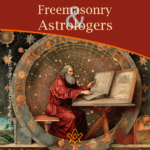 Unlocking the Mysteries: The Surprising Connection Between Freemasonry and Astrologers Revealed! Delve into the intriguing world of Freemasonry and explore its ties to astrological practices. Discover how these two distinct realms intersect, offering a fascinating glimpse into the esoteric interests of some Freemasons. Uncover the hidden links and unravel the enigmatic bond between Freemasonry and astrologers! |
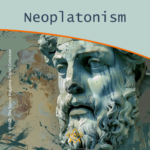 Neoplatonism, a philosophy with profound influence from the 3rd to the 6th century, merges Platonic ideals with Eastern thought, shaping Western and Middle-Eastern philosophy for two millennia. It emphasizes the unity of the individual with the supreme 'One', blending philosophy with theology and impacting major religious and philosophical movements, including Christianity and Islam. |
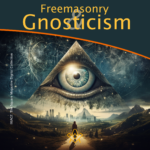 The enigmatic allure of Freemasonry's ancient rituals and Gnosticism's search for hidden knowledge capture the human spirit's endless quest for enlightenment. Between the stonemason's square and the Gnostic's divine spark lies a tantalizing intersection of philosophy, spirituality, and the pursuit of esoteric wisdom. Both traditions beckon with the promise of deeper understanding and moral elevation, inviting those who are drawn to unravel the tapestries of symbols and allegories. Whether through the fellowship of the lodge or the introspective journey of the soul, the paths of Freemasonry and Gnosticism represent a yearning to connect with something greater than ourselves—an impulse as old as time and as compelling as the mysteries they guard. |
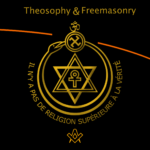 Embark on a journey through time and spirituality with our in-depth exploration of the Theosophical Society's Seal. This ancient emblem, rich with symbols, bridges humanity with the cosmos, echoing through the world's great faiths and diverse cultures. Our paper delves into the six mystical symbols, untangling their profound meanings and tracing their presence in historic art worldwide. Unaffiliated with worldly movements, these symbols open a window to esoteric wisdom. We also probe potential parallels with Freemasonry, seeking threads that might connect these storied organizations. Join us in unveiling the universal language of the spirit encoded within this enigmatic Seal. |
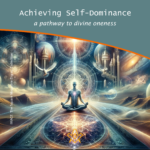 Discover the pathway to divine oneness through the concept of self-dominance. This thought-provoking essay explores the profound connection between self-control, spiritual growth, and achieving unity with the divine essence. With an interdisciplinary approach, it offers practical steps towards expanding consciousness and deepening our understanding of the divine. |
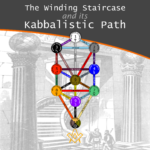 The Winding Staircase and its Kabbalistic Path The Winding Staircase in freemasonry is a renowned symbol of enlightenment. In this article, we explore its connection to Kabbalistic thought and how it mirrors the inner growth of a candidate as he progresses throughout his Masonic journey. From faith and discipline in Binah, to strength and discernment in Geburah, and finally to victory and emotional intuition in Netzach, each step represents a crucial aspect of personal development. Join us as we delve into the esoteric meanings of this powerful symbol. |
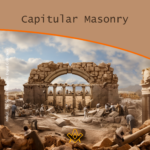 Unravel the mystic origins of Capitular Masonry, a secretive Freemasonry branch. Explore its evolution, symbolic degrees, and the Royal Arch's mysteries. Discover the Keystone's significance in this enlightening journey through Masonic wisdom, culminating in the ethereal Holy Royal Arch. |
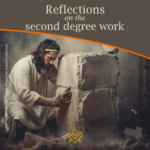 Reflections on the Second Degree Work Bro. Draško Miletić offers his reflections on his Second Degree Work – using metaphor, allegory and symbolism to understand the challenges we face as a Fellow Craft Mason to perfect the rough ashlar. |
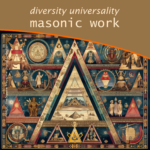 Diversity and Universality of Masonic Work Explore the rich tapestry of Masonic work, a testament to diversity and universality. Uncover its evolution through the 18th century, from the stabilization of Symbolic Freemasonry to the advent of Scottish rite and the birth of Great Continental Rites. Dive into this fascinating journey of Masonic systems, a unique blend of tradition and innovation. Antonio Jorge explores the diversity and universality of Masonic Work |
 Nonsense as a Factor in Soul Growth Although written 100 years ago, this article on retaining humour as a means of self-development and soul growth is as pertinent today as it was then! Let us remember the words of an ancient philosopher who said, when referring to the court jester of a king, “It takes the brightest man in all the land to make the greatest fool.” |
 Freemasonry: The Robe of Blue and Gold Three Fates weave this living garment and man himself is the creator of his fates. The triple thread of thought, action, and desire binds him when he enters into the sacred place or seeks admittance to the Lodge, but later this same cord is woven into the wedding garment whose purified folds shroud the sacred spark of his being. - Manly P Hall |
 By such a prudent and well regulated course of discipline as may best conduce to the preservation of your corporal and metal faculties in the fullest energy, thereby enabling you to exercise those talents wherewith god has blessed you to his glory and the welfare of your fellow creatures. |
 Jacob Ernst's 1870 treatise on the Philosophy of Freemasonry - The theory of Freemasonry is based upon the practice of virtuous principles, inculcating the highest standard of moral excellence. |
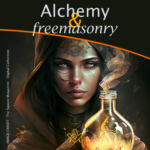 Alchemy, like Freemasonry, has two aspects, material and spiritual; the lower aspect being looked upon by initiates as symbolic of the higher. “Gold” is used as a symbol of perfection and the earlier traces of Alchemy are philosophical. A Lecture read before the Albert Edward Rose Croix Chapter No. 87 in 1949. by Ill. Bro. S. H. Perry 32° |
 The spirit of the Renaissance is long gone and today's globalized and hesitant man, no matter ideology and confession, is the one that is deprived of resoluteness, of decision making, the one whose opinion doesn't matter. Article by Draško Miletić, |
 A Mason's Work in the First Degree Every Mason's experiences are unique - here writer and artist Draško Miletić shares insights from his First Degree Work. |
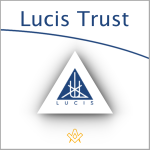 Initiation and the Lucis Trust The approach of the Lucis Trust to initiation may differ slightly to other Western Esoteric systems and Freemasonry, but the foundation of training for the neophyte to build good moral character and act in useful service to humanity is universal. |
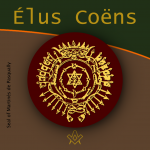 Who were the mysterious 18th century Élus Coëns – a.k.a The Order of Knight-Masons Elect Priests of the Universe – and why did they influence so many other esoteric and para-Masonic Orders? |
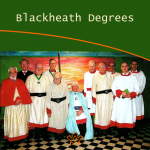 Bro. Chris Hatton gives us his personal reflections on the history of the 'house at Blackheath and the Blackheath Orders', in this wonderful tribute to Andrew Stephenson, a remarkable man and Mason. |
 Book Review - Cagliostro the Unknown Master The book review of the Cagliostro the Unknown Master, by the Editor of the book |
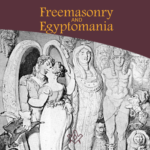 We explore fascinating and somewhat contentious historical interpretations that Freemasonry originated in ancient Egypt. |
 Is Freemasonry esoteric? Yes, no, maybe! |
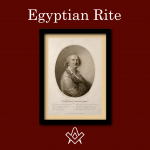 Egyptian Freemasonry, founder Cagliostro was famed throughout eighteenth century Europe for his reputation as a healer and alchemist |
masonic knowledge
to be a better citizen of the world
share the square with two brothers

click image to open email app on mobile device
